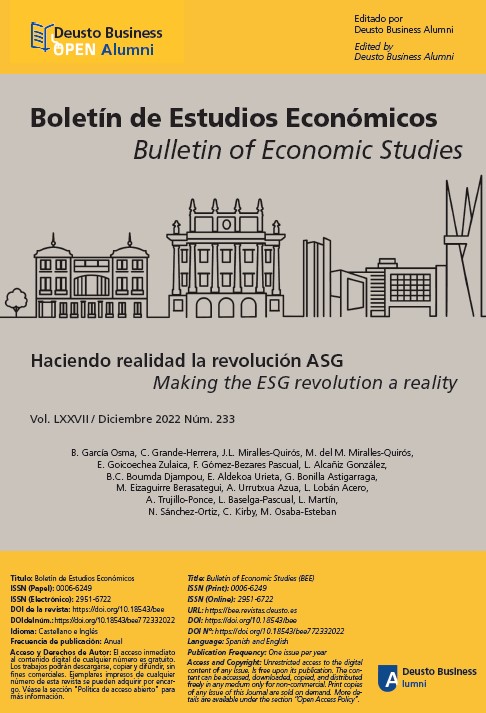Integration of ESG criteria in business management models and processes
Abstract
This article argues the need for the management of ESG aspects to move from a reactive approach driven by regulatory changes and reporting obligations, to a proactive one, where the concepts of sustainability are embedded in each one of the processes of the company, being necessary to review the processes, the organization and the information and integration tools used. After carrying out an in-depth reflection on governance models, operating models and risk management, the article highlights the role that digital transformation and the development of collaboration and innovation ecosystems throughout value chains, as fundamental drivers of this change.
Received: 17 October 2022
Accepted: 08 November 2022
References
Andreu, A. (2022). Estándares para el reporte de sostenibilidad: Dónde estamos y dónde llegaremos. https://bit.ly/3UHpwKA
Andreu, A., & Castilla, A. (2022). Información Financiera VS Información no Financiera: cuestión de madurez. http://bit.ly/3USLDxg
APQC (2018). APQC’s Process Classification Framework (PCF) - Cross Industry -PDF Version 7.2.1 | APQC. http://bit.ly/3E7WOvu
ASCM (2022). SCOR Mode. http://bit.ly/3AhaLWx
Ballentine, M., Callahan, W., Fava, S.J., Sottong, J., Stanway, J., & Wickwire, S. (2011). Corporate Value Chain (Scope 3) Accounting and Reporting Standard. Supplement to the GHG Protocol Corporate Accounting and Reporting Standard. GHG Protocol Team. http://bit.ly/3E4dL9Y
COSO.ORG (2022). Guidance on Enterprise Risk Management. http://bit.ly/3gektSK
CDP (2022). CDP Technical Note: Relevance of Scope 3 Categories by Sector CDP Climate Change Questionnaire. http://bit.ly/3Eh1Gyu
EFQM (2022). Organisational Change Management - EFQM. http://bit.ly/3GhAbqU
EUSKALIT (2022), EUSKALIT Kudeaketa Aurreratua - Gestión Avanzada | Modelo de Gestión Avanzada. http://bit.ly/3E8pBQo
Hobbs, A., & Linn, J. (2021). Will there be a ‘next’ if corporate governance is focused on the ‘now’? | EY - Global. http://bit.ly/3TCyVBR
PwC & WAS (2020). Sostenibilidad en los Consejos y en la Alta Dirección. http://bit.ly/3O4WXo1
Roger, C. (2022). El Sistema de Control Interno de la Información No Financiera (SCIINF). http://bit.ly/3hCsYr7
License:
Works published in this journal are available since 2021 under the Creative Commons Attribution-NonCommercial 4.0 International license - CC BY-NC 4.0. Content prior to 2021 is not covered by the journal's current Open Access policy.
Authors' Rights:
Authors retain copyright over their work published in the Bulletin of Economic Studies and grant the Bulletin of Economic Studies non-exclusive rights to exploit the work for layout, publication, and dissemination purposes. This license allows the Bulletin of Economic Studies to distribute, reproduce, and disseminate the work on its platform and through other media, subject to the conditions outlined in this notice.
Readers' Rights:
Readers may read, download, print, search, share (copy, redistribute, or link to full text), or adapt (remix, transform, and build upon the material) the content, provided that:
- The materials are not used for commercial purposes.
- The original work is properly cited, including the name of the author and the source.
- Any modifications made to the original content are clearly indicated.
Commercial use of the materials is prohibited without the express permission of the authors. For clarity, commercial use is defined as any activity intended for financial gain or involving direct commercial exchange.
Conditions of Use:
The use of content must not infringe the rights of others or be used in a way that could damage the reputation of the author or the Bulletin of Economic Studies.
Responsibility for Content:
Authors are responsible for the content of their papers and the Bulletin of Economic Studies is not responsible for the opinions therein expressed.
More Information:
Open Access, Licensing, and Copyright Policy


.jpg)
.jpg)
.jpg)








